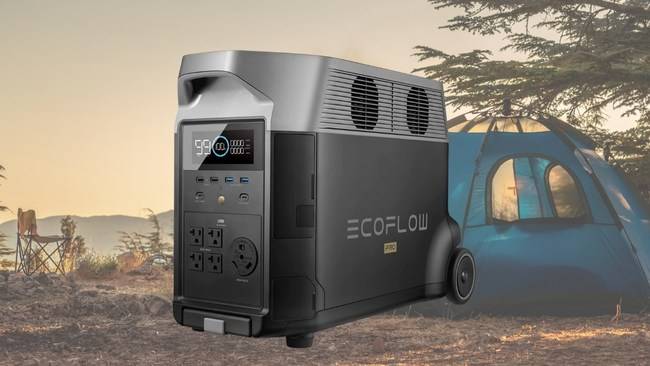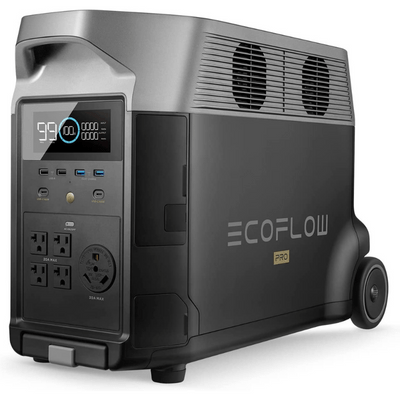EcoFlow built its name on sleek, fast-charging solar generators — but the EcoFlow Delta Pro is something else entirely.
It’s not just the brand’s most advanced product — it’s a clear signal of where EcoFlow is headed: full-scale, off-grid, home energy independence.
Over the past few years, EcoFlow has grown from a promising startup to a serious player in the clean tech space, delivering portable power stations that rival gas generators in speed, output, and reliability. The Delta Pro pushes that evolution forward — with a 3.6kWh LFP battery, EV charging support, solar integration, and the ability to run entire households during an outage.
In this EcoFlow Delta Pro review, we’ll look at how this flagship model embodies EcoFlow’s long-term vision — and whether it lives up to the promise of clean, silent, whole-home backup power.
EcoFlow’s Evolution: From River Series to Delta Pro
EcoFlow didn’t enter the energy space to compete with industry giants — it started by powering coolers, camera gear, and camp stoves.
The original River series was compact, portable, and built for weekend adventures — a clean alternative to noisy gas generators, not a challenge to the grid.
Then came the Delta 1300 — and things changed. With faster charging, a larger battery, and enough wattage to keep refrigerators and routers running during blackouts, it became a breakout product. Suddenly, EcoFlow wasn’t just for campers. It was showing up in basements, garages, and disaster prep kits across the country.
But the EcoFlow Delta Pro? That’s where the company stops being a gadget brand and starts acting like an energy company.
The Delta Pro is more than a power station. With 3.6kWh of LFP capacity, 240V compatibility, EV charging support, and seamless integration with solar panels and smart home systems, it’s a modular home backup system in disguise. Portable? Technically. But this isn’t gear you toss in a backpack. It’s gear you wire into your home.
While other brands are still optimizing for tailgates and RVs, EcoFlow is quietly building toward grid independence — layering in solar, smart panels, app control, and scalable energy storage. They’re not just reacting to demand. They’re designing for the next energy transition — and the Delta Pro is their proof of concept.
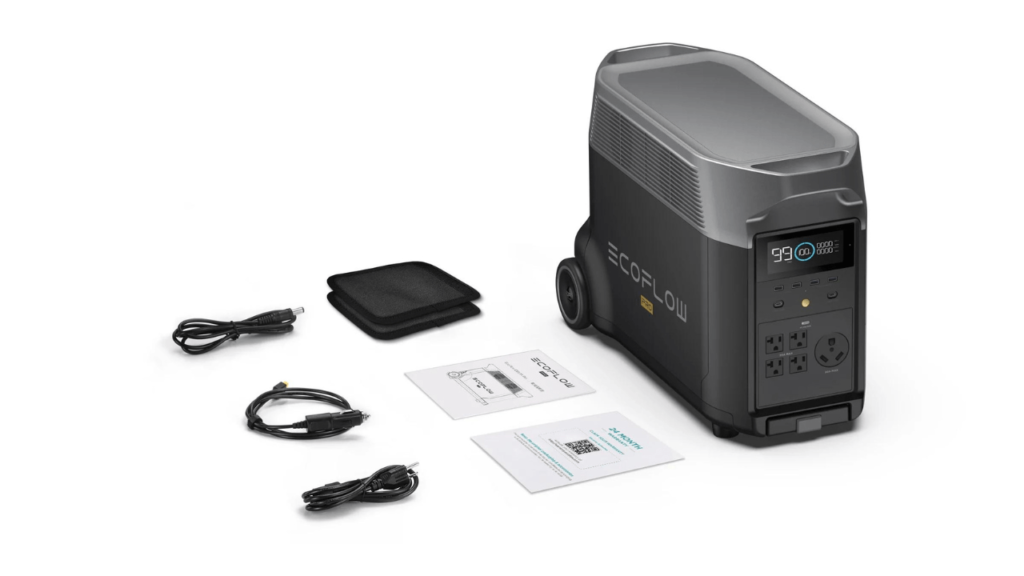
EcoFlow Delta Pro Review: Features, Specs, and Performance
The EcoFlow Delta Pro doesn’t belong in the same category as other portable power stations — and that’s the point.
While most solar generators are built for weekend camping or keeping your Wi-Fi on during a short outage, the Delta Pro was designed for something much bigger: grid independence.
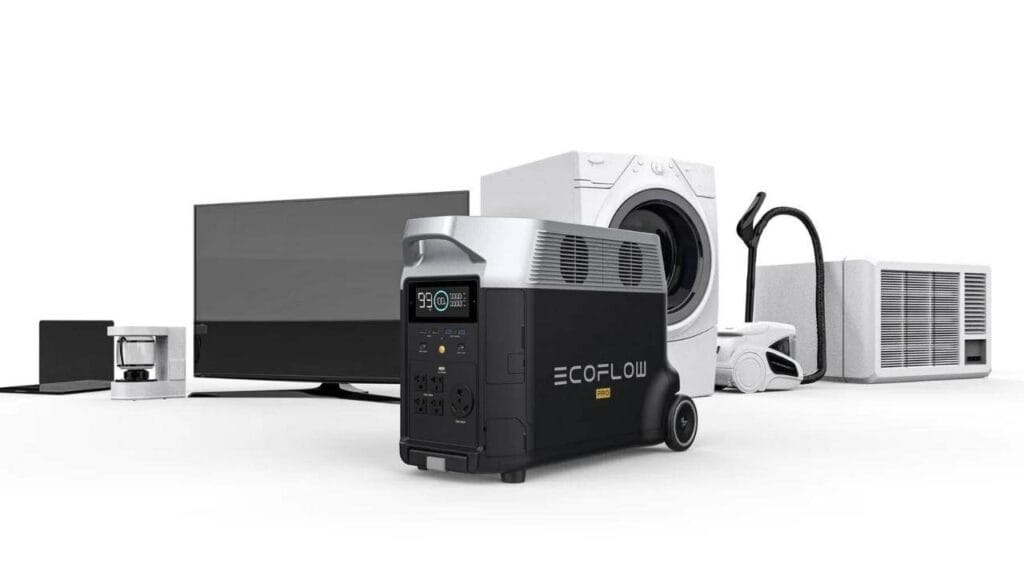
LFP Battery Power Built for the Long Haul
At its core, the Delta Pro houses a 3,600Wh lithium iron phosphate (LFP) battery rated for up to 6,500 charge cycles. That’s years of daily use without a major drop in performance — the kind of longevity that puts it in the same conversation as fixed home energy systems.
With 3,600W of AC output and 7,200W surge capacity, the Delta Pro powers almost everything in a modern household — refrigerators, window AC units, power tools, sump pumps, and more. And if that’s not enough, you can link two units together or expand up to 25kWh with EcoFlow’s modular battery ecosystem.
Most power stations try to be efficient. This one tries to be unshakable.
Multiple Ways to Recharge — Fast
EcoFlow didn’t just increase battery size — they engineered the Delta Pro to recharge faster than most competitors can discharge.
- Wall outlet: 0–80% in 1 hour
- EV station charging: Supports Level 2 AC
- Solar input: Up to 1,600W with multiple panels
- Dual input: Combine solar and AC for extreme recharge speed
That means even after a total blackout, the Delta Pro is back to full in a matter of hours — not overnight.
Unlike Bluetti’s AC300 or Jackery’s Explorer series, EcoFlow isn’t building toys — it’s building tools for energy resilience.
Home Integration Without the Installer
What separates the Delta Pro from most portable stations is what it does after you plug it in.
- Smart Home Panel compatibility allows automatic switchover during an outage
- 240V support powers heavy-duty appliances like dryers or well pumps
- App control gives you real-time data, scheduled usage, and port toggling
- EV charging means you can top off your car — or vice versa
This is the difference between “portable power” and emergency infrastructure.
And it’s not just for preppers — it’s for families in wildfire zones, rural homes with unstable utility lines, or anyone tired of living at the mercy of a fragile grid.
EcoFlow Delta Pro Portability: Is It Really Mobile?
The Delta Pro weighs just under 100 pounds. No sugarcoating it — this isn’t portable in the picnic sense.
But with built-in wheels and a telescoping handle, it’s meant to be relocated, not carried. You’re not hiking with it — you’re rolling it into your garage, shed, or back patio when the lights go out.
It trades mobility for muscle — and for what it’s designed to do, that’s exactly the right call.
What the Delta Pro Tells Us About EcoFlow’s Brand Strategy
EcoFlow didn’t build this to compete with other solar generators. They built it to replace them.
The Delta Pro represents a turning point: the moment EcoFlow stops being a portable power brand and becomes a legitimate player in home energy systems. It’s smart, scalable, and strong enough to challenge fixed installations — without the complexity or the contractor.
This isn’t a backup plan. It’s a new baseline for what home power should look like.
EcoFlow Delta Pro Pros and Cons
No product is perfect, and the EcoFlow Delta Pro is no exception. What makes it stand out also brings limitations — depending on how you plan to use it.
Here’s what it gets right — and what you’ll want to consider before making the investment.
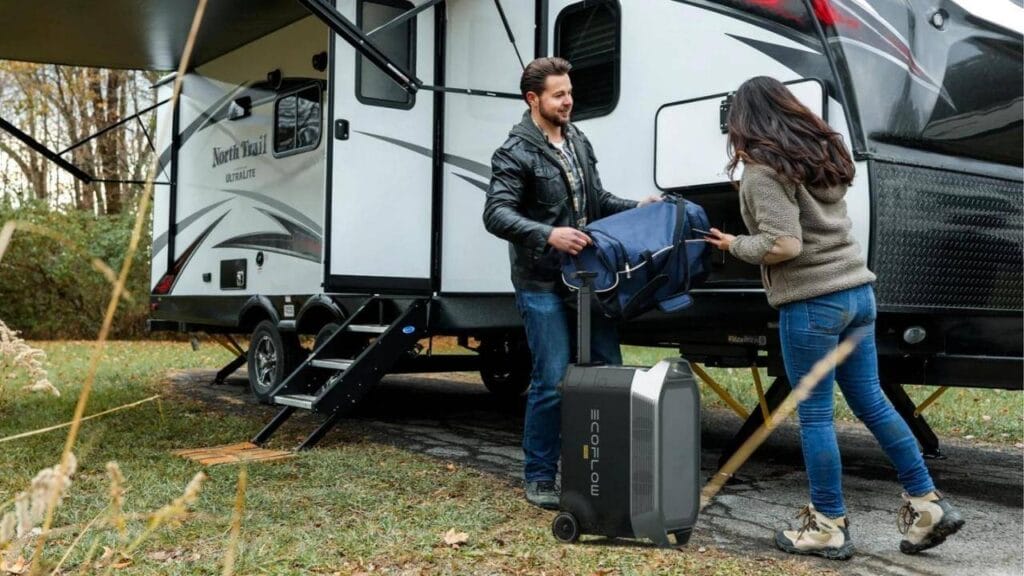
What It Gets Right - The Pros
Massive Capacity with Room to Grow
The Delta Pro’s 3.6kWh LFP battery is impressive on its own. But what sets it apart is the ability to expand — up to 25kWh — turning it into a serious contender for whole-home backup power.
Blazing-Fast Recharge Speeds
Thanks to EcoFlow’s X-Stream tech and EV-level charging input, this unit can hit 80% charge in an hour via wall outlet or dual input. That’s 5–10x faster than many solar generators in its class.
True Home Integration Capabilities
With 240V support, the Smart Home Panel, and app control, the Delta Pro becomes part of your home’s energy infrastructure — not just a plug-in backup.
Silent, Emission-Free Operation
Unlike gas generators, it runs silently, produces zero fumes, and can be used indoors or in enclosed environments. That’s critical for urban homes, off-grid cabins, or medical needs.
Battery Chemistry Built to Last
EcoFlow’s move to LFP means users get longer lifespans (6,500+ cycles), better thermal stability, and safer performance — especially in high-use scenarios.
Where It Falls Short - The Cons
Weight and Portability
At 99 pounds, the Delta Pro is technically “portable,” but you’re not picking it up and throwing it in your truck. It’s meant to roll short distances, not travel light. For mobile-first users, this is more stationary gear than travel tech.
High Initial Investment
At around $3,699 (before accessories), it’s priced as a premium system. Factor in expansion batteries, solar panels, or home integration gear, and the total cost climbs fast.
Note: Prices may vary — EcoFlow frequently runs sales and seasonal discounts, so check their store for the latest deals.
Not a Plug-and-Play for Everyone
If you want full integration (240V, Smart Panel, solar), you’ll need basic electrical knowledge or a professional install. EcoFlow keeps it modular, but it’s not “open the box and you’re done.”
Fan Noise Under Heavy Load
While silent during standby, the Delta Pro’s fans do spin up under high draw or during rapid charging. It’s still quiet compared to gas — but not truly silent if you’re sitting next to it.
Is the EcoFlow Delta Pro Right for You?
The EcoFlow Delta Pro isn’t your everyday solar generator. It’s not for charging phones at the beach or running a projector on movie night. It’s for people who need serious, silent, off-grid power — and can’t afford to compromise when the grid goes dark.
Here’s who should be looking closely:
Homes in Blackout-Prone Areas
If your home regularly experiences power outages — from wildfires, storms, or failing infrastructure — the Delta Pro delivers uninterrupted, whole-home solar backup power without the fumes, fuel, or noise. With up to 25kWh of expandable capacity, it keeps freezers, Wi-Fi, lights, sump pumps, and AC units running when everything else shuts off.
It’s not a luxury. It’s a resilience system for when the grid gets unreliable.
Off-Grid Cabins and Remote Living
For cabins, homesteads, or tiny homes running off solar, the Delta Pro acts as a clean, centralized energy bank. Its LFP battery, fast recharge options, and high solar input make it ideal for remote setups — especially when you don’t want to deal with gas refills or loud generators disrupting the landscape. Pair it with
EcoFlow solar panels, and you’ve got a self-sufficient off-grid power solution.
Contractors and Mobile Professionals
If you’re running tools or tech in remote locations, the Delta Pro offers a quiet alternative to gas generators. It powers compressors, lights, saws, and workstations — all without emissions or refueling. Just know: at 99 pounds, it’s best suited for semi-fixed setups or job sites with limited access to conventional power, not rapid on/off deployment.
Households Transitioning from Gas to Solar
Want to get off fossil fuels but not ready for rooftop installs? The Delta Pro is a practical entry point into home solar battery systems. Use it as a backup during outages, then expand with solar panels, extra batteries, and EcoFlow’s Smart Home Panel to create a fully integrated, fuel-free system over time.
Families Needing Medical or Critical Backup
For those who rely on powered medical devices — CPAPs, oxygen concentrators, refrigerated medications — the Delta Pro offers quiet, dependable energy storage without ventilation concerns or startup lag. It can also serve as a whole-home battery during outages, keeping your essentials safe and running smoothly.
EcoFlow Delta Pro vs Delta Max and Delta 1300: Comparison Chart
EcoFlow’s product lineup can be confusing at a glance — especially when specs overlap or prices get close. If you’re wondering whether the Delta Pro is right for you or if one of the smaller units might do the trick, this side-by-side comparison will help.
Here’s how the Delta Pro stacks up against the Delta 1300, Delta Max, and Delta 2.
| Feature | Delta 1300 | Delta Max | Delta Pro |
|---|---|---|---|
| Battery Capacity | 1,260Wh | 2,016Wh (expandable to ~6kWh) | 3,600Wh (expandable to 25kWh) |
| Battery Chemistry | NCM | NCM | LFP (LiFePO4) |
| AC Output (Running / Surge) | 1,800W / 3,300W | 2,400W / 5,000W | 3,600W / 7,200W |
| Lifespan (Cycles to 80%) | ~800 cycles | ~800 cycles | 6,500+ cycles |
| Recharge Speed (AC) | 0–80% in 1 hour | 0–80% in ~1.6 hours | 0–80% in 1 hour |
| Weight | ~30.9 lbs (14kg) | ~48 lbs (22kg) | ~99 lbs (45kg) |
| Use Case | Portable, emergency power | Mid-size home backup | Full home/off-grid power system |
| 240V Support | ❌ | ❌ | ✅ |
| Smart Panel Compatible | ❌ | ❌ | ✅ |
| Best For | Light travel, basic backup | Apartment dwellers, short-term outages | Full home systems, off-grid setups, solar homes |
Frequently Asked Questions (FAQ)
Yes, the EcoFlow Delta Pro is worth it if you need a powerful solar generator with a high-capacity battery that can be extended by two more units, and if you don’t mind the weight of 99 lbs.
Yes, the EcoFlow Delta Pro can power a small house or cabin. Just make sure you use 20 or 30-amp power cables.
An EcoFlow Delta Pro will last up to 3,500 full discharge cycles before its capacity drops to 80%. However, it can last much longer than that, but with reduced battery capacity.
Yes, EcoFlow power stations are good. Both their mid-sized power stations like the Delta 1300 and large-sized Delta Pro are at the very top of the market.
Both EcoFlow and Bluetti are great power station brands. As a rule, EcoFlow power stations take charge quicker and weigh less, while Bluetti has more ways of charging and often has more advanced features such as a touch screen and wireless phone charging.
EcoFlow is a US-Chinese company.
Jackery ranges its products from small-size to mid-size and it’s probably a better choice for people who need a few features and a truly portable and lightweight power station to use with portable solar panels. EcoFlow’s product range is much more diverse, including many features that Jackery power stations don’t have.
Should You Buy the EcoFlow Delta Pro?
The EcoFlow Delta Pro isn’t just another portable power station — it’s the centerpiece of a modular, smart energy platform that can scale from weekend camping trips to full-home backup. With a massive 3,600Wh LFP battery, solar integration, smart app control, and the ability to expand up to 25kWh, it’s built for users who want more than a safety net — they want energy independence.
Yes, it’s heavy. Yes, it’s pricey. But for high-demand use cases — from off-grid cabins and RV life to grid failure prep — few alternatives match its versatility, lifespan, or eco-friendly design. EcoFlow has created a product that doesn’t just compete with gas generators — it aims to replace them entirely.
If you’re transitioning toward clean power or need a future-ready home energy solution, the Delta Pro is the benchmark. Few competitors offer the same level of performance, ecosystem support, or long-term reliability.
